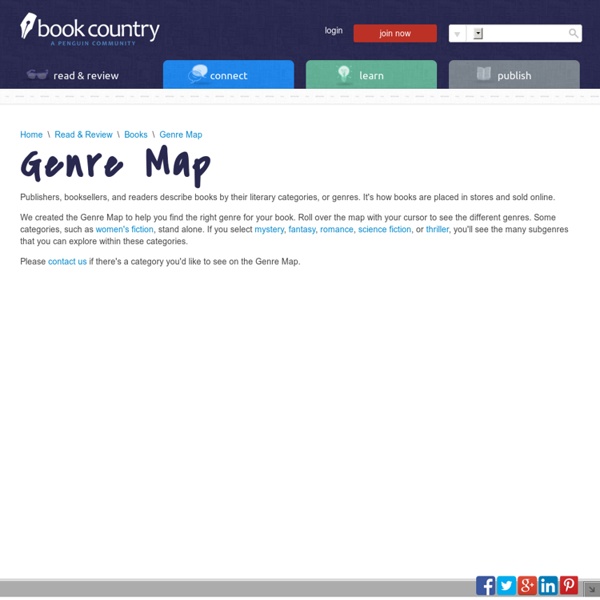



http://www.bookcountry.com/books/Map/Default.aspx
Related: eBooks • About WritingFree Media Library in Blooms This list is distinctive as the resources are a) free and b) almost exclusively browser based. The list is also sorted by Blooms, meaning you are able to more easily consider your student outcomes FIRST. There are a few exceptions. A number of resources listed offer ‘pro’ services, but are still particularly useful using the free services they offer. There are a couple of software downloads included.
David Foster Wallace on Writing, Self-Improvement, and How We Become Who We Are by Maria Popova “Good writing isn’t a science. It’s an art, and the horizon is infinite. You can always get better.” In late 1999, David Foster Wallace — poignant contemplator of death and redemption, tragic prophet of the meaning of life, champion of intelligent entertainment, admonisher against blind ambition, advocate of true leadership — called the office of the prolific writer-about-writing Bryan A. Garner and, declining to be put through to Garner himself, grilled his secretary about her boss.
The Author's To-Don't List From established to aspiring author—typically in an interview format, you never see the advice go much further than: read, write, and learn as much about the craft as you can. It’s rather standard, often recycled, and although I agree with it, I’d have to say most of my more memorable lessons came through trial and error. Specifically, these are things you shouldn’t do as per the trial and error of others. Not simple blunders, mind you, but large lapses in judgment that pay lasting damages. My collection of funny emails from my inbox. Subject: 5 MINUTE MANAGEMENT COURSE Lesson 1: A man is getting into the shower just as his wife is finishing up her shower, when the doorbell rings.
The Psychology of Writing and the Cognitive Science of the Perfect Daily Routine Reflecting on the ritualization of creativity, Bukowski famously scoffed that “air and light and time and space have nothing to do with.” Samuel Johnson similarly contended that “a man may write at any time, if he will set himself doggedly to it.” And yet some of history’s most successful and prolific writers were women and men of religious daily routines and odd creative rituals. (Even Buk himself ended up sticking to a peculiar daily routine.) Social Networking Sites for Writers, Message Boards for Writers We know Facebook and Myspace are used by many writers, but we listed new and old sites that are geared to writers. There are other social networking sites out there for film-makers and musicians and on and on, but these are the ones pointed directly at writers. Story Link Social Networking community for writers that allows you to create profiles and join groups.
External Tip - 10 Advanced Photoshop Tutorials You Should See In this category we want to give you an advice to other great sites, where you can get a lot of very useful information, inspirations and materials. Here I collected 10 great Photoshop tutorials, which can help you to expand your skills. Create a Devastating Tidal Wave in Photoshop Umberto Eco’s Antilibrary: Why Unread Books Are More Valuable to Our Lives than Read Ones by Maria Popova How to become an “antischolar” in a culture that treats knowledge as “an ornament that allows us to rise in the pecking order.” “It is our knowledge — the things we are sure of — that makes the world go wrong and keeps us from seeing and learning,” Lincoln Steffens wrote in his beautiful 1925 essay. Vladimir Nabokov on Writing, Reading, and the Three Qualities a Great Storyteller Must Have by Maria Popova “Between the wolf in the tall grass and the wolf in the tall story there is a shimmering go-between. That go-between, that prism, is the art of literature.” “Often the object of a desire, when desire is transformed into hope, becomes more real than reality itself,” Umberto Eco observed in his magnificent atlas of imaginary places. Indeed, our capacity for self-delusion is one of the most inescapable fundamentals of the human condition, and nowhere do we engage it more willingly and more voraciously than in the art and artifice of storytelling. In the same 1948 lecture that gave us Vladimir Nabokov’s 10 criteria for a good reader, found in his altogether fantastic Lectures on Literature (UK; public library), the celebrated author and sage of literature examines the heart of storytelling:
Book of Imaginary Beings Book of Imaginary Beings was written by Jorge Luis Borges, published in 1957 under the original Spanish title Manual de zoología fantástica, and expanded in 1967 and 1969 to the final El libro de los seres imaginarios. The English edition, created in collaboration with translator Norman Thomas di Giovanni, contains descriptions of 120 mythical beasts from folklore and literature. In the preface, Borges states that the book is to be read "as with all miscellanies... not... straight through... Rather we would like the reader to dip into the pages at random, just as one plays with the shifting patterns of a kaleidoscope"; and that "legends of men taking the shapes of animals" have been omitted. Creatures mentioned[edit]
Relationship Rules Human beings crave intimacy, need to love and be loved. Yet people have much trouble doing so. It's clear from the many letters I get that lots of folks have no idea what a healthy relationship even looks like. Because I care about these things, and care about the environments children grow in, I'm using this space as an attempt to remedy the problem—again. From many sources and many experts, I have culled some basic rules of relationships.